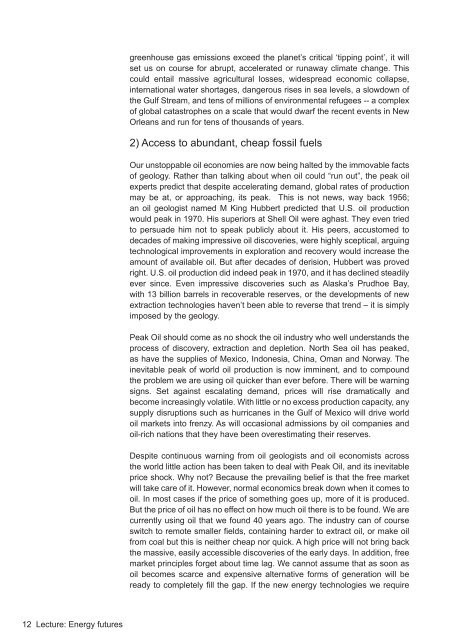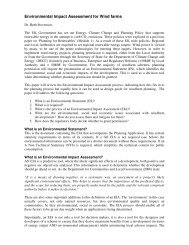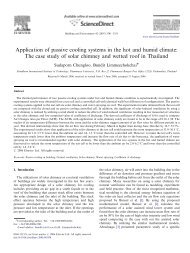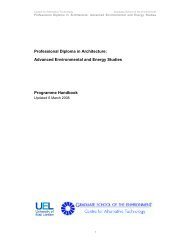Module B1 Study Book - the Graduate School of the Environment
Module B1 Study Book - the Graduate School of the Environment
Module B1 Study Book - the Graduate School of the Environment
Create successful ePaper yourself
Turn your PDF publications into a flip-book with our unique Google optimized e-Paper software.
greenhouse gas emissions exceed <strong>the</strong> planet’s critical ‘tipping point’, it will<br />
set us on course for abrupt, accelerated or runaway climate change. This<br />
could entail massive agricultural losses, widespread economic collapse,<br />
international water shortages, dangerous rises in sea levels, a slowdown <strong>of</strong><br />
<strong>the</strong> Gulf Stream, and tens <strong>of</strong> millions <strong>of</strong> environmental refugees -- a complex<br />
<strong>of</strong> global catastrophes on a scale that would dwarf <strong>the</strong> recent events in New<br />
Orleans and run for tens <strong>of</strong> thousands <strong>of</strong> years.<br />
2) Access to abundant, cheap fossil fuels<br />
Our unstoppable oil economies are now being halted by <strong>the</strong> immovable facts<br />
<strong>of</strong> geology. Ra<strong>the</strong>r than talking about when oil could “run out”, <strong>the</strong> peak oil<br />
experts predict that despite accelerating demand, global rates <strong>of</strong> production<br />
may be at, or approaching, its peak. This is not news, way back 1956;<br />
an oil geologist named M King Hubbert predicted that U.S. oil production<br />
would peak in 1970. His superiors at Shell Oil were aghast. They even tried<br />
to persuade him not to speak publicly about it. His peers, accustomed to<br />
decades <strong>of</strong> making impressive oil discoveries, were highly sceptical, arguing<br />
technological improvements in exploration and recovery would increase <strong>the</strong><br />
amount <strong>of</strong> available oil. But after decades <strong>of</strong> derision, Hubbert was proved<br />
right. U.S. oil production did indeed peak in 1970, and it has declined steadily<br />
ever since. Even impressive discoveries such as Alaska’s Prudhoe Bay,<br />
with 13 billion barrels in recoverable reserves, or <strong>the</strong> developments <strong>of</strong> new<br />
extraction technologies haven’t been able to reverse that trend – it is simply<br />
imposed by <strong>the</strong> geology.<br />
Peak Oil should come as no shock <strong>the</strong> oil industry who well understands <strong>the</strong><br />
process <strong>of</strong> discovery, extraction and depletion. North Sea oil has peaked,<br />
as have <strong>the</strong> supplies <strong>of</strong> Mexico, Indonesia, China, Oman and Norway. The<br />
inevitable peak <strong>of</strong> world oil production is now imminent, and to compound<br />
<strong>the</strong> problem we are using oil quicker than ever before. There will be warning<br />
signs. Set against escalating demand, prices will rise dramatically and<br />
become increasingly volatile. With little or no excess production capacity, any<br />
supply disruptions such as hurricanes in <strong>the</strong> Gulf <strong>of</strong> Mexico will drive world<br />
oil markets into frenzy. As will occasional admissions by oil companies and<br />
oil-rich nations that <strong>the</strong>y have been overestimating <strong>the</strong>ir reserves.<br />
Despite continuous warning from oil geologists and oil economists across<br />
<strong>the</strong> world little action has been taken to deal with Peak Oil, and its inevitable<br />
price shock. Why not? Because <strong>the</strong> prevailing belief is that <strong>the</strong> free market<br />
will take care <strong>of</strong> it. However, normal economics break down when it comes to<br />
oil. In most cases if <strong>the</strong> price <strong>of</strong> something goes up, more <strong>of</strong> it is produced.<br />
But <strong>the</strong> price <strong>of</strong> oil has no effect on how much oil <strong>the</strong>re is to be found. We are<br />
currently using oil that we found 40 years ago. The industry can <strong>of</strong> course<br />
switch to remote smaller fields, containing harder to extract oil, or make oil<br />
from coal but this is nei<strong>the</strong>r cheap nor quick. A high price will not bring back<br />
<strong>the</strong> massive, easily accessible discoveries <strong>of</strong> <strong>the</strong> early days. In addition, free<br />
market principles forget about time lag. We cannot assume that as soon as<br />
oil becomes scarce and expensive alternative forms <strong>of</strong> generation will be<br />
ready to completely fill <strong>the</strong> gap. If <strong>the</strong> new energy technologies we require<br />
12 Lecture: Energy futures











